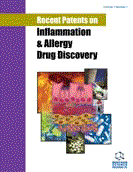Abstract
Background: Inflammatory Bowel Disease (IBD) cannot be controlled easily and the recurrence is the most challenging issue for the physicians. There are various controlled and colon targeted drug delivery systems available for the treatment with limited success rate. Nanoparticles prepared by using the colon targeted polymers such as chitosan may improve the IBD due to their smaller size, unique physico chemical properties and targeting potential.
Objective: The aim of this investigation was designed to formulate and develop a colon targeted polysaccharide nanoparticles of rifaximin (RFX) by using linear polysaccharide chitosan, for the improvement of rifaximin solubility, overall therapeutic efficacy and colon targeting. Methods: The research was focused on developing RFX nanoparticles for the treatment of Inflammatory Bowel Disease (IBD) by ionic gelation method. Nanoparticles were subjected to various characterization techniques such as XRD, FTIR and mean particle size (MPS) by Master Sizer and Zeta Sizer. Transmission Electron Microscopy (TEM), drug entrapment efficiency and zeta potential are also determined for the developed formulations. The efficiency of drug release from prepared formulation was studied in vitro by using a dialysis bag diffusion technique in the buffer condition mimicking stomach, intestine and colonic pH conditions. Results: The prepared nanoparticles demonstrated the size in the nano range. The drug release profile was controlled in the upper GI tract and the maximum amount of drug was released in the colonic conditions. The prepared nanoparticles significantly improved the solubility of rifaximin. The zeta potential of the best chitosan preparation was found to be 37.79, which confirms the stability of prepared nanosuspension. Conclusion: Nanoparticles with small particle size found to have high encapsulation efficiency and relatively high loading capacity and predetermined in vitro release profile.Keywords: Colon targeting, polymeric nanoparticles, release kinetics, solubility, TEM, Zeta potential.
 54
54 5
5 1
1 1
1

















